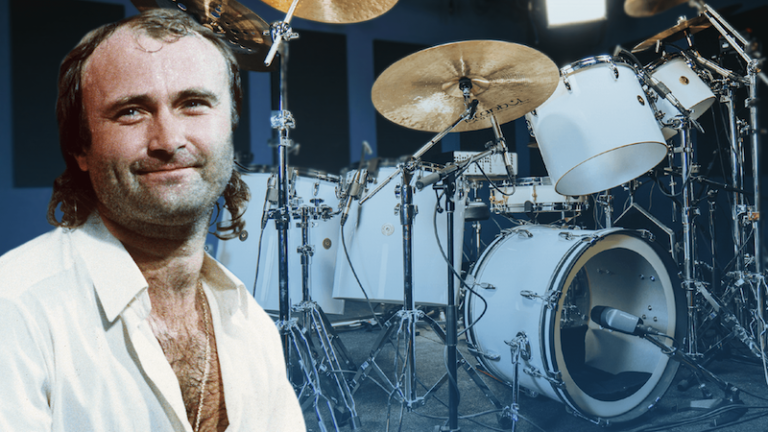
1981 – Face Value

Side one
1/ In the Air Tonight – 5:34 – Drum sheet – Drum cover
2/ This Must Be Love – 3:55
3/ Behind the Lines – 3:53
4/ The Roof Is Leaking – 3:16
5/ Droned – 2:49
6/ Hand in Hand – 5:20 – Drum sheet – Drum sheet easy
Side two
1/ I Missed Again – 3:41
2/ You Know What I Mean – 2:33
3/ Thunder and Lightning – 4:12
4/ I’m Not Moving – 2:33
5/ If Leaving Me Is Easy – 4:54
6/ Tomorrow Never Knows – 4:15
7/ Over the Rainbow – 0:32
Credits
Phil Collins – vocals, drums, Roland VP-330 vocoder (1,6,10), CR-78 drum machine (1,6,12), Prophet-5 synthesizer (1,2,5–7,10–12), Fender Rhodes (1,2,9,11), percussion (2,10), piano (4–8,10), handclaps (5,9), congas (5), marimba (6), acoustic guitar (13) / Daryl Stuermer – guitars (1–3,6,7,9,11,12), banjo (4), 12-string guitar (5) / Eric Clapton – guitar (4,11) / Joe Partridge – slide guitar (4) / John Giblin – bass guitar (1,9,10,12) / Alphonso Johnson – bass (2,3, 6,7,11) / L. Shankar – violin (1,5,7,12), tamboura (5), “voice drums” (5) / J. Peter Robinson – Prophet-5 (3) / Stephen Bishop – background vocals (2) / Arif Mardin – string arrangements (8,11) / Don Myrick – tenor saxophone (3,6,7,9,12), alto sax solo (11) / Louis Satterfield – trombone (3,6,7,9,12) / Rahmlee Michael Davis and Michael Harris – trumpets (3,6,7,9,12), flugelhorns (11) / Ronnie Scott – tenor saxophone solo (7)1982 – Hello, I Must Be Going!
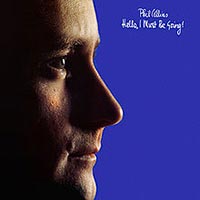
Side one
1/ I Don’t Care Anymore – 5:00
2/ I Cannot Believe It’s True – 5:14
3/ Like China – 5:05 – Drum sheet
4/ Do You Know, Do You Care? – 4:57
5/ You Can’t Hurry Love – 2:57
Side two
6/ It Don’t Matter to Me – 4:12
7/ Thru These Walls – 5:02 – Drum sheet
8/ Don’t Let Him Steal Your Heart Away – 4:43 – Drum sheet – Drum sheet easy
9/ The West Side – 4:59 – Drum sheet
10/ Why Can’t It Wait ‘Til Morning – 3:01
Credits
Phil Collins – vocals, drums (1–9), keyboards (1–4,6,7,9), bass pedals (1,4,9), percussion (2,6,9), handclaps (3), timpani (4), trumpet (4), tambourine (5), marimba (7), acoustic piano (8,10) / Daryl Stuermer – guitars (1–9) / John Giblin – bass guitar (2,3,5,8) / Mo Foster – bass guitar (6,7) / J. Peter Robinson – acoustic piano, vibraphone and glockenspiel (5) / The Phenix Horns – horns (2,6,9) / Don Myrick – alto and tenor saxophones, alto sax solo (2,9) / Louis “Louie Louie” Satterfield – trombone / Michael Harris – trumpet / Rahmlee Michael Davis – trumpet / The Phenix Choir (Phil Collins, Don Myrick, Louis Satterfield, Michael Harris, Rahmlee Michael Davis and Peter Newton) – additional vocals (2)1985 – No Jacket Required
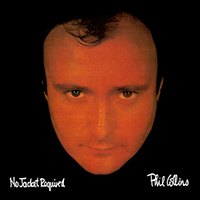
1/ Sussudio – 4:23
2/ Only You Know and I Know – 4:20
3/ Long Long Way to Go – 4:20
4/ I Don’t Wanna Know – 4:12
5/ One More Night – 4:47
Side two
6/ Don’t Lose My Number – 4:46
7/ Who Said I Would – 4:01
8/ Doesn’t Anybody Stay Together Anymore – 4:18
9/ Inside Out – 5:14
10/ Take Me Home – 5:51
Credits
Phil Collins – vocals, backing vocals, Roland TR-909 (1,10), keyboards (2,3,5–11), bass (2), drums (2,4,6-11), LinnDrum (2,6,8), Roland TR-808 (3,5), Simmons electronic drums (credited on 2016 release as ‘Simmonds’) (3,7), vocoder (7), kalimba (7) / David Frank – keyboards (1,7), additional keyboards (6), Minimoog bass (1,7), Oberheim DMX (1) / Nick Glennie-Smith – keyboards (11) / Daryl Stuermer – guitars (1–10), keyboards (4) / Leland Sklar – bass guitar (3–6, 8–11), piccolo bass (3,10) / The Phenix Horns, arranged by Tom Tom 84 – horns (1,2,7) / Don Myrick – saxophones, sax solo (5,9) / Louis Satterfield – trombone / Michael Harris – trumpet / Rahmlee Michael Davis – trumpet / Gary Barnacle – sax solo (4,7) / Arif Mardin – string arrangements (5), orchestral introduction (11) / Sting – backing vocals (3,10) / Peter Gabriel – backing vocals (10) / Helen Terry – backing vocals (10)1989 – …But Seriously
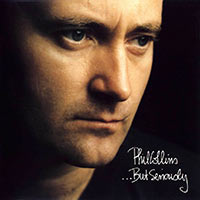
1/ Hang in Long Enough – 4:44
2/ That’s Just the Way It Is – 5:20
3/ Do You Remember? – 4:36
4/ Something Happened on the Way to Heaven – 4:52 – Drum sheet
5/ Colours – 8:51
6/ I Wish It Would Rain Down – 5:28 – Drum sheet – Drum cover
7/ Another Day in Paradise – 5:22 – Drum sheet
8/ Heat on the Street – 3:51
9/ All of My Life – 5:36 – Drum sheet
10/ Saturday Night and Sunday Morning – 1:26 – Drum sheet
11/ Father to Son – 3:28
12/ Find a Way to My Heart – 6:08
Credits
Phil Collins – vocals (1–9,11,12), keyboards (1-9,11,12), drums (1,4-12), drum machine (2,3), percussion (2,3,10,12), tambourine (6,8) / Steve Winwood – Hammond organ (9) / Daryl Stuermer – guitar (1–4,8,11,12) / Dominic Miller – guitar (1,4,5,7,9) / Eric Clapton – guitar (6) / Nathan East – bass (1,4) / Leland Sklar – bass (2,5,7-12) / Pino Palladino – bass (3,6) / The Phenix Horns (1,4,5,10,12): Don Myrick – saxophone, alto sax solo (9) / Louis Satterfield – trombone / Harry Kim – trumpet / Rhamlee Michael Davis – trumpet / Alex Brown, Marva King and Lynne Fiddmont – backing vocals (1,4,8,9) / David Crosby – vocals (2,7) / Stephen Bishop – vocals (3)
1990 – Serious Hits… Live!
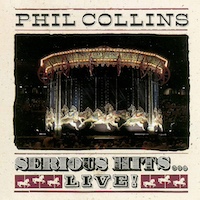
1/ Something Happened on the Way to Heaven – 4:59
2/ Against All Odds (Take a Look at Me Now) – 3:28
3/ Who Said I Would – 4:28
4/ One More Night – 5:49
Side 2
5/ Don’t Lose My Number – 4:42
6/ Do You Remember? – 5:40
7/ Another Day in Paradise – 5:36
8/ Separate Lives – 5:16
Side 3
1/ In the Air Tonight – 6:35
2/ You Can’t Hurry Love – 2:54
3/ Two Hearts – 3:07
4/ Sussudio – 7:14
Side 4
5/ A Groovy Kind of Love – 3:30
6/ Easy Lover – 4:46
7/ Take Me Home – 8:39
The DVD version, recorded at Berlin’s Waldbühne on 15 July 1990, stands out as Collins‘s preferred performance, highlighting the unique energy of the German audience post-Berlin Wall. The concert features memorable moments, including an extended applause after “Something Happened on the Way to Heaven” and a lighter vigil during “Doesn’t Anybody Stay Together Anymore,” offering fans a deep dive into Collins‘s live performance prowess. The album’s impact was recognized with a nomination for British Male Artist at the 1992 Brit Awards, underscoring Collins‘s significant influence in the music world.
Credits
Phil Collins – vocals, electric grand piano, drums / Brad Cole – keyboards / Daryl Stuermer – guitars / Leland Sklar – bass / Chester Thompson – drums / Bridgette Bryant – vocals / Arnold McCuller – vocals / Fred White – vocals / Don Myrick – alto saxophone / Louis “Lui Lui” Satterfield – trombone / Rahmlee Michael Davis – trumpet / Harry Kim – trumpet1993 – Both Sides

1/ Both Sides of the Story – 6:42 – Drum sheet
2/ Can’t Turn Back the Years – 4:40
3/ Everyday – 5:43
4/ I’ve Forgotten Everything – 5:15
5/ We’re Sons of Our Fathers – 6:24
6/ Can’t Find My Way – 5:09
7/ Survivors – 6:05
8/ We Fly So Close – 7:33 – Drum sheet
9/ There’s a Place for Us – 6:52
10/ We Wait and We Wonder – 7:01
11/ Please Come Out Tonight – 5:46
Credits
Phil Collins – All instruments.
1996 – Dance into the Light
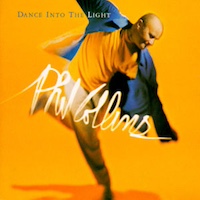
1/ Dance into the Light – 4:23
2/ That’s What You Said – 4:22
3/ Lorenzo – 5:52
4/ Just Another Story – 6:24
5/ Love Police – 4:08
6/ Wear My Hat – 4:33
7/ It’s in Your Eyes – 3:01
8/ Oughta Know by Now – 5:27
9/ Take Me Down – 3:21
10/ The Same Moon – 4:13
11/ River So Wide – 4:55
12/ No Matter Who – 4:47
13/ The Times They Are a-Changin’ – 5:07
Credits
Phil Collins – vocals, drums, percussion, kalimba (1), lead guitar (2,5,7,10), rhythm guitar (2,5,7,12), keyboards (5,7–10,12), slide guitar (12), acoustic piano (13), bagpipes (13) / Brad Cole – keyboards (1,3,4,6,11), strings (8), organ (9,10,13) / Daryl Stuermer – lead guitar (1,3,4,6,8,13), rhythm guitar (2,5,7,9,10), guitars (11) / Ronnie Caryl – rhythm guitar (1–10,13), lead guitar solo (12) / Nathan East – bass guitar / Amy Keys – backing vocals (1,3,6,8–11) / Arnold McCuller – backing vocals (1,3,6,8–11) / Vine Street Horns (1,4,6,8,9) : Andrew Woolfolk – saxophones / Arturo Velasco – trombone / Harry Kim – trumpet / Daniel Fornero – trumpet
2002 – Testify
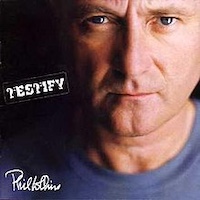
2/ Come with Me – 4:34
3/ Testify – 6:31
4/ Don’t Get Me Started – 4:41
5/ Swing Low – 5:08
6/ It’s Not Too Late – 3:59
7/ This Love This Heart – 4:04
8/ Driving Me Crazy – 4:37
9/ The Least You Can Do – 4:21
10/ Can’t Stop Loving You – 4:17
11/ Thru My Eyes – 5:07
12/ You Touch My Heart – 4:42
Credits
Phil Collins – vocals, all instruments except where noted
James Sangar – additional programming (1-5,8,11) / Jamie Muhoberac – keyboards (9,10) / Tim Pierce – guitars (1-11), nylon guitar (12) / Daryl Stuermer – guitar (9,10) / Paul Bushnell – bass (3-10) / Eric Rigler – Uilleann pipes (9)
2010 – Going Back
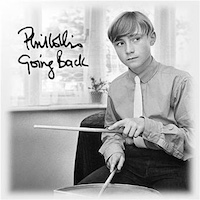
2/ (Love Is Like a) Heatwave – 2:53
3/ Uptight (Everything’s Alright) – 3:03
4/ Some of Your Lovin’ – 3:19
5/ In My Lonely Room – 2:25
6/ Take Me in Your Arms (Rock Me for a Little While) – 2:59
7/ Blame It on the Sun – 3:27
8/ Papa Was a Rolling Stone – 6:44
9/ Never Dreamed You’d Leave in Summer – 2:59
10/ Standing in the Shadows of Love – 2:42
11/ Do I Love You – 2:50
12/ Jimmy Mack – 2:56
13/ Something About You – 2:47
14/ Love Is Here and Now You’re Gone – 2:40
15/ Loving You Is Sweeter Than Ever – 2:48
16/ Going to a Go-Go – 2:49
17/ Talkin’ About My Baby – 2:47
18/ Going Back – 4:36
Credits
Phil Collins – lead vocals, backing vocals (1,4,7,8,10–13,15–18), drums (1–8,10–18), percussion (1–3,5,6,8,10–18), keyboards (1–3,11,14,17,18), acoustic piano (4,5), bass (4,9,11,14), glockenspiel (5), electric piano (8), harp (8), handclaps (8), footstomps (12), guitars (14), organ (16), fingersnaps (18) / Jason Rebello – vibraphone (5,13), acoustic piano (6,7,12,13,15,16), electric piano (7) / Ray Monette – guitar (1–3,5,6,8,10,12,13,15–17), wah-wah guitar (8) / Eddie Willis – guitar (1–3,5,6,8,10,12,13,15–18) / Ronnie Caryl – acoustic guitar (7,11) / Bob Babbitt – bass (1–3,5–8,10,12,13,15–18) / Graeme Blevins – tenor saxophone (1–3,5,6,12–14,16,17), tenor sax solo (13,16) / Phil Todd – baritone saxophone (1–3,5,6,12–17), flute (9), piccolo (10) / John Aram – trombone (1–3,5,6,12–14,16,17), handclaps (8), fingersnaps (18), horn arrangements and transcriptions / Guy Barker – trumpet (1–3,5,6,12–14,16,17), trumpet solo (8) / Tom Rees-Roberts – trumpet (1–3,5,6,12–14,16,17) / Celeste-Marie Roy – bassoon (10) / Steve Jones – handclaps (8), fingersnaps (18) / Nicholas and Matthew Collins – handclaps (8), fingersnaps (18), footstomps (12), backing vocals (14) / Scott Stroman – string arrangements and transcriptions, conductor Menuhin Academy – strings / Connie Jackson-Comegys – backing vocals (2,3,5–7,11,12,14) / Lynne Fiddmont-Linsey – backing vocals (2,3,5–7,11,12,14)Find all drum sheet music, drum lessons, and bass tablature here: All the products about Phil Collins

